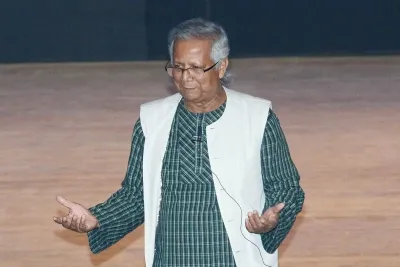Are Rights Bodies Alarmed by Bangladesh's 'Monsoon Uprising' Transforming into Yunus's Repressive Campaign?

Synopsis
Key Takeaways
- Yunus's government is facing serious allegations of repression.
- The 'Monsoon Uprising' has not achieved its intended goals.
- International human rights organizations are voicing concerns.
- Public trust in the government is deteriorating.
- The situation warrants close monitoring and analysis.
Dhaka, Aug 31 (NationPress) The interim government of Bangladesh, under the leadership of Chief Adviser Muhammad Yunus, is under scrutiny for alleged oppression, as highlighted by multiple human rights organizations in a recent report.
Beyond alienating local civil society and diminishing his international credibility, Yunus's oppressive measures have led to the collapse of last year's 'Monsoon Uprising', leaving him in a precarious position.
Nearly a year after Sheikh Hasina's removal, the global rights community has raised alarms. Journalists and academics are voicing their concerns. Even previously supportive international figures are now questioning whether Yunus's Bangladesh is truly less authoritarian than Hasina's regime, according to political and security analyst Chris Blackburn in an article for the digital platform 'Narrativa 360'.
“The so-called ‘Monsoon Uprising’ — once seen as a chance for renewal on the streets — has devolved into a failure. Instead of energizing the populace or paving the way for democratic reforms, Yunus has unleashed riot police against student protestors, journalists, and political activists,” he remarked.
“The Monsoon Uprising — rather than ushering in a new era of accountability — has fallen into yet another tale of oppression, police brutality, and empty rhetoric,” Blackburn noted.
In the past two weeks alone, we have witnessed assaults on demonstrators, harsh treatment of students, and even an attack on Nurul Haque Nur, a figure whose political stance may be divisive, yet whose rights to express and protest should remain unquestionable, the report stated.
Once viewed by international observers as a corrective measure to Sheikh Hasina's authoritarianism, Yunus has now adopted the very repressive strategies he professed to oppose, Blackburn remarked.
Yunus’s aggressive approach has not escaped notice. In March, a coalition of global human rights organizations — including Human Rights Watch, Amnesty International, the Committee to Protect Journalists, and Fortify Rights — directly addressed him, as noted in the report.
“Their collective letter condemned assaults on the press, denouncing the harassment, intimidation, and arbitrary detention of journalists as intolerable during any political transition. Instead of heeding these warnings, Yunus has intensified his crackdown, extending his targets to opposition activists and critical scholars,” the report added.
The disheartening aspect of Yunus’s interim government is how swiftly its reputation has soured. Where once there was talk of healing the nation post-Hasina, there is now only growing distrust,” it concluded.










